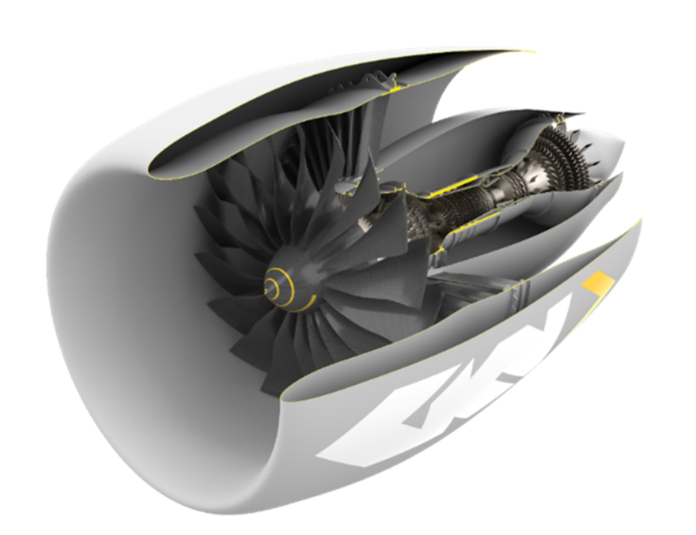Universal Hydrogen signs LOIs with 3 carriers for hydrogen-powered aircraft
15 July 2021
Universal Hydrogen (earlier post) has signed LOIs with Icelandair Group (Iceland), Air Nostrum (Spain), and Ravn Air (Alaska) for aftermarket conversion of aircraft to hydrogen propulsion and for the supply of green hydrogen fuel using Universal Hydrogen’s modular capsules.
Rendering of regional airplane with conversion kit and fuel capsules.
Icelandair. Universal Hydrogen signed a letter of intent (LOI) with Icelandair Group under which Icelandair and Universal Hydrogen will pursue the implementation of green hydrogen as a propellant for Icelandair’s domestic aircraft fleet.
Universal Hydrogen is enabling this transformation with its aftermarket hydrogen conversion kit for regional aircraft, as well as its fuel distribution system based on modular hydrogen capsule technology.
For Universal Hydrogen and Icelandair, this LOI is the first step of an ambitious multilateral initiative, which requires working with Icelandic hydrogen producers, transportation companies, and airports. In a country with an electricity network powered by renewable energy, this represents an opportunity to decarbonize one of the most challenging industries—aviation.
Given a positive outcome of the project and upon completion of the Dash 8 conversions of the Icelandair domestic fleet, Universal Hydrogen and Icelandair would enter into a long-term fuel services contract to provide cost-effective green hydrogen for Icelandair’s fleet at scale. The net outcome of this relationship is to realize operational efficiencies as sustainability objectives are achieved.
Air Nostrum. Under the terms of the LOI with Air Nostrum, a regional airline based in Valencia, Spain, Air Nostrum would purchase eleven of Universal Hydrogen’s turboprop conversion kits for use across its existing and future fleet. These kits encompass a hydrogen fuel cell and electric motor that replaces the aircraft’s existing turboprop engine. They also provide for compatibility with Universal Hydrogen’s modular hydrogen capsule technology that allows for the delivery of hydrogen to any airport without any purpose-built infrastructure.
Alongside the aircraft conversions, Universal Hydrogen would become Air Nostrum’s long-term green hydrogen service provider. The conversion of Air Nostrum’s turboprop fleet to a Universal Hydrogen-powered, zero-carbon configuration would be concluded after an operational evaluation of the design and performance. The aircraft are expected to have equivalent or better unit economics compared to the existing fleet.
Ravn Air. Under the terms of this LOI, Ravn is committed to purchasing five of Universal Hydrogen’s conversion kits that will integrate the company’s modular hydrogen capsule technology and hydrogen powertrain into Ravn’s growing regional turboprop fleet. In a transportation segment that is critical to the way of life in Alaska, the conversions will provide a zero-carbon solution for both passenger and cargo services.
GKN Aerospace leads new Swedish National project on hydrogen propulsion
- £2M collaborative two-year H2JET programme to push development of key subsystems for gas turbine based hydrogen propulsion of medium range civil aircraft
- Public-private investment and collaboration with universities, knowledge institutes and SME partners from across Sweden, supported by Swedish Energy Agency
- H2JET reinforces GKN Aerospace’s position at forefront of next generation of sustainable hydrogen propulsion technology worldwide
GKN Aerospace is leading a Swedish national collaboration programme called H2JET, aiming to develop technical solutions for three important engine subsystems for H2-propulsion of medium range civil aircraft. The two-year project, which started this month, sees GKN Aerospace collaborate with the Swedish Energy Agency,Chalmers University of Technology, Lund University, KTH Royal Institute of Technology, University West, Research institutes of Sweden (RISE) and Oxeon.
Hydrogen is expected to play a key role in the decarbonisation strategy of aviation as it can power aircraft efficiently, leaving water as the only by-product. Power can be generated by either direct combustion, the focus of H2JET, or by generating onboard electrical power by use of a fuel cell, the focus of GKN Aerospace’s ‘H2GEAR’ program launched earlier this year.
Whilst H2GEAR is exploring a liquid hydrogen propulsion system for sub-regional aircraft, H2JET will explore hydrogen combustion powered turboprop or turbofan engines for the single aisle market for potential entry into service on intra-European routes in 2035.
H2JET puts GKN Aerospace at the heart of the technology developments needed for the future of more sustainable aviation. This would create a new generation of clean air travel, eliminating harmful CO2 emissions.
By validating subsystem- and component technologies for hydrogen combustion engines, H2JET will speed up the development of vital international engine- and aircraft demonstrator programmes, such as Clean Aviation Partnership in the recently launched EU framework programme Horizon Europe.

|
|






Ingen kommentarer:
Legg inn en kommentar
Merk: Bare medlemmer av denne bloggen kan legge inn en kommentar.